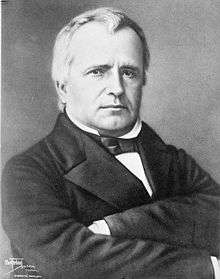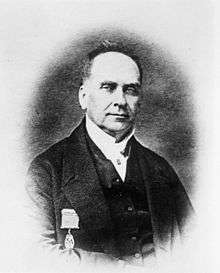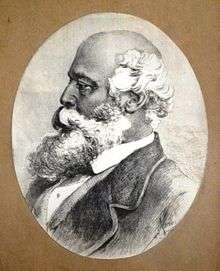Responsible government
Responsible government is a conception of a system of government that embodies the principle of parliamentary accountability, the foundation of the Westminster system of parliamentary democracy. Governments (the equivalent of the executive branch) in Westminster democracies are responsible to parliament rather than to the monarch, or, in a colonial context, to the imperial government, and in a republican context, to the president, either in full or in part. If the parliament is bicameral, then the government is responsible first to the parliament's lower house, which is more numerous, always directly elected and thus more representative than the upper house. Responsible government of parliamentary accountability manifests itself in several ways. Ministers account to Parliament for their decisions and for the performance of their departments. This requirement to make announcements and to answer questions in Parliament means that ministers have to have the privileges of the "floor" which are only granted to those who are members of either house of Parliament. Secondly, and most importantly, although ministers are officially appointed by the authority of the head of state and can theoretically be dismissed at the pleasure of the sovereign, they concurrently retain their office subject to their holding the confidence of the lower house of Parliament. When the lower house has passed a motion of no confidence in the government, the government must immediately resign or submit itself to the electorate in a new general election.
Lastly, the head of state is in turn required to effectuate his executive power only through these responsible ministers. He or she must never attempt to set up a "shadow" government of executives or advisors and attempt to use them as instruments of government, or to rely upon their "unofficial" advice. He/she is bound to take no decision or action, which is put into effect under the color of his/her executive power, without that action being as a result of the counsel and advisement of his/her responsible ministers. His/her ministers are required to counsel him/her (i.e., explain to him/her and be sure he/she understands any issue that he/she will be called upon to decide); and, to form and have recommendations for him/her (i.e., their advice or advisement) to choose from; which are the ministers’ formal, reasoned, recommendations as to what course of action should be taken.
An exception to this is Israel, which operates under a simplified version of the Westminster system, essentially cutting out the middleman: many non-reserve powers which would have been exercised by the President of Israel on advice in an unmodified system are exercised directly by the officers which would have given such advice, the Prime Minister of Israel is dominant over the Cabinet and not a Primus inter pares office, and Presidential reserve powers do not exist.
Canada
In the history of Canada, responsible government means that the government must be responsive to its citizens, that it must operate responsibly, and that government ministers must be accountable or responsible to Parliament. The British colonies that formed the Dominion of Canada in 1867 evolved gradually into responsible government rather than achieving it through a revolution as in the United States.
Early Canadian governors and administrators were answerable only to British authorities. Even after the formation of elected legislative assemblies, governors and their executive councils did not require the consent of elected legislators in order to govern. It was only in the decades leading up to Canadian Confederation in 1867 that the governing councils of those British North American colonies that had not joined the American Revolution in 1776 became responsible to the elected representatives of the people.[1]
Responsible government was a major element of the gradual development of Canada towards independence. The concept of responsible government is associated in Canada more with self-government than with parliamentary accountability; hence there is the notion that the Dominion of Newfoundland "gave up responsible government" when it suspended its self-governing status in 1933, as a result of financial problems. It did not regain responsible government until it became a province of Canada in 1948.[2]
In the aftermath of the American Revolution in 1776, the British government became more sensitive to unrest in its remaining colonies with large populations of British colonists. After the 1837 Lower Canada Rebellion led by Louis-Joseph Papineau, and the 1837–1838 Upper Canada Rebellion led by William Lyon Mackenzie, Lord Durham was appointed governor general of British North America and had the task of examining the issues and determining how to defuse tensions. In his report, one of his recommendations was that colonies which were developed enough should be granted "responsible government". This term specifically meant the policy that British-appointed governors should bow to the will of elected colonial assemblies.
The first instance of responsible government in the British Empire outside of the United Kingdom itself was achieved by the colony of Nova Scotia in January–February 1848 through the efforts of Joseph Howe. The plaque in the Nova Scotia House of Assembly erected by the Historic Sites and Monuments Board of Canada reads:
First Responsible Government in the British Empire.
The first Executive Council chosen exclusively from the party having a majority in the representative branch of a colonial legislature was formed in Nova Scotia on 2 February 1848. Following a vote of want of confidence in the preceding Council, James Boyle Uniacke, who had moved the resolution, became Attorney General and leader of the Government. Joseph Howe, the long-time campaigner for this "Peaceable Revolution", became Provincial Secretary. Other members of the Council were Hugh Bell, Wm. F. Desbarres, Lawrence O.C. Doyle, Herbert Huntingdon, James McNab, Michael Tobin, and George R. Young.
The colony of New Brunswick soon followed in May 1848 when Lieutenant Governor Edmund Walker Head brought in a more balanced representation of Members of the Legislative Assembly to the Executive Council and ceded more powers to that body.


In the Province of Canada, responsible government was introduced with the ministry of Louis-Hippolyte LaFontaine and Robert Baldwin in spring 1848; it was put to the test in 1849, when Reformers in the legislature passed the Rebellion Losses Bill. This was a law that provided compensation to French-Canadians who suffered losses during the Rebellions of 1837–1838 in Lower-Canada.

The Governor General, Lord Elgin, had serious misgivings about the bill but nonetheless assented to it despite demands from the Tories that he refuse to do so. Elgin was physically assaulted by an English-speaking mob for this, and the Montreal Parliament building was burned to the ground in the ensuing riots. Nonetheless, the Rebellion Losses Bill helped entrench responsible government into Canadian politics.
In time, the granting of responsible government became the first step on the road to complete independence. Canada gradually gained greater and greater autonomy over a considerable period of time through inter imperial and commonwealth diplomacy, including the British North America Act of 1867, the Statute of Westminster of 1931, and even as late as the patriation of the British North America Act in 1982 (see Constitution of Canada).
Australia and New Zealand
While the various colonies in Australia were either sparsely populated or penal settlements or both, executive power was in the hands of the Governors, who, because of the great distance from their superiors in London and the resulting very slow communication, necessarily exercised vast powers. However, the early colonists, coming mostly from the United Kingdom, were familiar with the Westminster system and made efforts to reform it to increase the opportunity for ordinary men to participate.
The Governors and London therefore set in motion a gradual process of establishing a Westminster system in the colonies, not so fast as to get ahead of population or economic growth, nor so slow as to provoke clamouring for revolutionary change as happened in America. Initially, this took the form of appointed or partially elected Legislative Councils. Then, during the 1850s, all Australian colonies except Western Australia, along with New Zealand, established both representative and responsible government; Western Australia did the same in 1890.
Cape Colony


The Cape Colony, in Southern Africa, was under responsible self-government from 1872 until 1910 when it became the Cape Province of the new Union of South Africa.[3]
Under its previous system of representative government, the Ministers of the Cape Government reported directly to the British Imperial Governor, and not to the locally elected representatives in the Cape Parliament. Among Cape citizens of all races, growing anger at their powerlessness in influencing unpopular imperial decisions had repeatedly led to protests and rowdy political meetings – especially during the early "Convict Crisis" of the 1840s. A popular political movement for responsible government soon emerged, under local leader John Molteno. A protracted struggle was then conducted over the ensuing years as the movement (known informally as "the responsibles") grew increasingly powerful, and used their parliamentary majority to put pressure on the British Governor, withholding public finances from him, and conducting public agitations. Not everyone favoured responsible government though, and pro-imperial press outlets even accused the movement of constituting "crafts and assaults of the devil".[4]
Finally, in 1872, the Colonial Office and new Governor Henry Barkly were won over, and Molteno instituted responsible government, making the Ministers directly responsible to the Cape Parliament, and becoming the Cape's first Prime Minister.[5]
The ensuing period saw an economic recovery, a massive growth in exports and an expansion of the colony's frontiers. Despite political complications that arose from time to time (such as an ill-fated scheme by the British Colonial Office to enforce a confederation in Southern Africa in 1878, and tensions with the Afrikaner-dominated Government of Transvaal over trade and railroad construction), economic and social progress in the Cape Colony continued at a steady pace until a renewed attempt to extend British control over the hinterland caused the outbreak of the Anglo-Boer Wars in 1899.[6]
An important feature of the Cape Colony under responsible government was that it was the only state in southern Africa (and one of very few in the world at the time) to have a non-racial system of voting. [7][8] Later however – following the South Africa Act 1909 to form the Union of South Africa – this multi-racial universal suffrage was steadily eroded, and eventually abolished by the Apartheid government in 1948.
Former British colonies with responsible government
- 1848 – Province of Nova Scotia
- 1848 – Province of Canada
- 1851 – Prince Edward Island
- 1854 – Province of New Brunswick
- 1855 – Newfoundland (suspended from 1934 to 1949), the Colony of New South Wales, and the Colony of Victoria
- 1856 – Colony of New Zealand, the Colony of New South Wales and the Colony of Tasmania
- 1857 – Province of South Australia
- 1859 – Colony of Queensland (separated from New South Wales in that year with self-government from the beginning)
- 1872 – The Cape Colony, South Africa
- 1890 – Colony of Western Australia
- 1893 – Natal, South Africa
- 1906 – Transvaal, South Africa
- 1907 – Orange River Colony, South Africa
- 1921 – Malta (suspended from 1936 to 1947, and from 1959 to 1962)
- 1923 – Southern Rhodesia
- 1947 – India
See also
Notes
- ↑ "Responsible Government and Ministerial Responsibility". Parliament of Canada. October 2015. Retrieved 2016-11-07.
- ↑ "Responsible Government, 1855-1933". Newfoundland and Labrador Heritage Website. 2016. Retrieved 2016-11-07.
- ↑ A.L. Harrington: The Parliament of the Cape of Good Hope, with special reference to party politics 1872–1910. Government Printer, 1973.
- ↑ The Zingari. 9 June 1871. p.94.
- ↑ African Historical Biographies.
- ↑ Phyllis Lewsen: The First Crises in Responsible Government in the Cape Colony. University of The Witwatersrand / Argief-jaarboek vir Suid-Afrikaanse geskiedenis. 1940/3.
- ↑ RFM Immelman: Men of Good Hope, 1804–1954. CTCC: Cape Town, 1955. Chapter 6 The Anti-convict Agitation. p.154.
- ↑ Molteno, P. A. The Life and Times of John Charles Molteno. Comprising a History of Representative Institutions and Responsible Government at the Cape. Volume II. London: Smith, Elder & Co., Waterloo Place, 1900. p.214
References
- Arthur Berriedale Keith. Responsible Government in the Dominions, 1912.
- Molteno, P. A. The Life and Times of John Charles Molteno. Comprising a History of Representative Institutions and Responsible Government at the Cape. London: Smith, Elder & Co., Waterloo Place, 1900.
- Status and Respectability in the Cape Colony, 1750–1870 : A Tragedy of Manners. Robert Ross, David Anderson. Cambridge University Press. 1 July 1999. 220 pages. ISBN 0-521-62122-4.
External links
- Forsey, Eugene A. (1981) How Canadians Govern Themselves, Government of Canada, 58 p.
- Hamer, David J., Can Responsible Government Survive in Australia Parliament of Australia Papers on Parliament No. 26, August 1995
- Rathgeber, Brent (September 10, 2014). Irresponsible Government: The Decline of Parliamentary Democracy in Canada. Dundurn Press. ISBN 9781459728370.
- Salles, Denis (2011). "Responsibility based environmental governance". S.A.P.I.EN.S. 4 (1). Retrieved 15 June 2011.